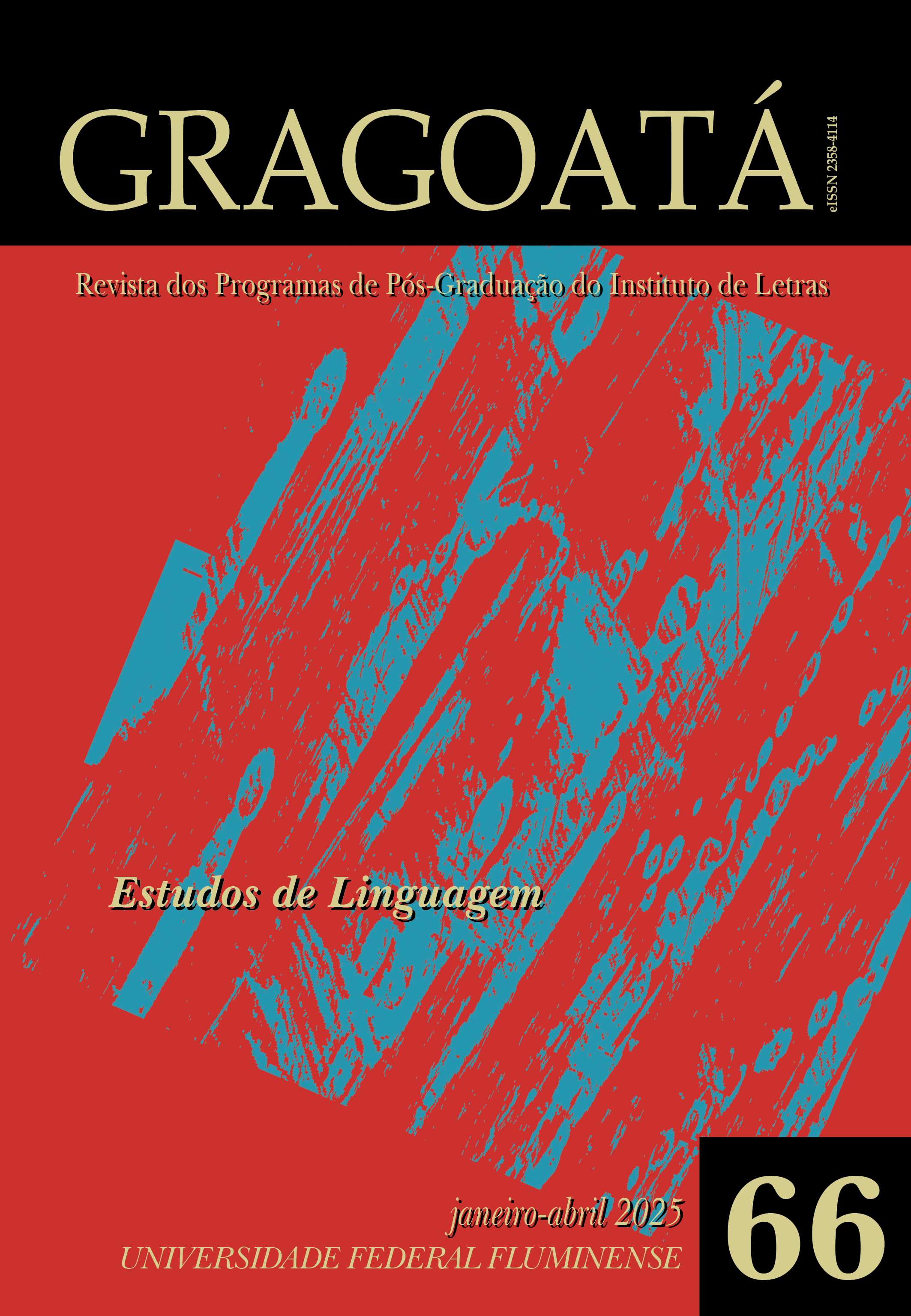From monolingualism to host multilingualism
DOI:
https://doi.org/10.22409/gragoata.v30i66.63952.ptKeywords:
Language Policy, Immigrants, CODAs, Language TeachingAbstract
This article aims to discuss the need for a change in language policies and educational practices in Brazil, promoting the appreciation of multilingualism and linguistic diversity, especially in school contexts that serve immigrants and refugees. The research explores the transition from a monolingual language policy to an approach that recognizes and values linguistic diversity, through an educational experience in a public school in the city of Dourados, Mato Grosso do Sul. The educational context is challenging, as these schools, which already had Indigenous students speaking Guarani, now receive a growing number of immigrants and refugees, such as Venezuelans and Haitians, who do not master Portuguese. The theoretical framework addresses linguistic repression and the need to recognize linguistic diversity as a valuable resource. The adopted methodology is qualitative, based on reports from students in the undergraduate programs of Language and Psychology who participated in the university extension project “Linguistic Solidarity,” which involved monitoring elementary school classes with students from different language backgrounds over a semester. From qualitatively selected reports, the article seeks to (1) share situations that are often not discussed involving bi/multi/plurilingualism; (2) problematize the urgencies in this educational context, which is representative of other scenarios; and (3) promote a reflection that inspires political movements in favor of the rights of the community affected by the dynamics of monolingualism. The results highlight the feasibility and urgency of implementing changes in the teaching model, promoting a more inclusive and supportive educational environment aligned with the needs of a globalized world.
Downloads
References
ANUNCIAÇÃO, Renata Franck Mendonça de. A língua que acolhe pode silenciar? Reflexões sobre o conceito de português como língua de acolhimento. Revista X, Curitiba, v. 13, n. 1, p. 35-56, 2018.
BRASIL. Base Nacional Comum Curricular: Ensino Médio. Brasília: MEC/Secretaria de Educação Básica, 2018.
BRASIL. Ministério da Educação. Parâmetros curriculares nacionais para o ensino médio: temas transversais. Brasília: MEC, 1998.
BUIN, Edilaine; BIONDO, Fabiana. “Falar corretamente é poder”: ideologias linguísticas, ensino de língua e acolhimento. In: SILVA, Wagner Rodrigues (org.). Contribuições sociais da linguística aplicada: uma homenagem a Inês Signorini. Campinas: Pontes, 2021. p. 33-53
CAVALCANTI, Marilda. Educação linguística na formação de professores de línguas: intercompreensão e práticas translíngues. In: MOITA LOPES, Luiz Paulo da (org.). Linguística aplicada na modernidade recente: festschrift para Antonieta Celani. São Paulo: Parábola, 2013. p. 211-226
FREINET, Celestin. Para uma escola do povo: guia prático para a organização material, técnica e pedagógica da escola popular. Tradução de Eduardo Brandão. São Paulo: Martins Fontes, 2001.
FREINET, Celestin. Pedagogia do bom senso. 7. ed. São Paulo: Martins Fontes, 2004.
GUIMARÃES, Thayse Figueira; BUIN, Edilaine; GARCIA, Rosana Irani Daza; RIBEIRO, Cristiene Oliveira. Práticas translíngues como recurso no acolhimento de migrantes venezuelanos em sala de aula de língua portuguesa. Revista X, v. 15, n. 7, p. 83-102, 2020.
LI, Wei. Moment analysis and translanguaging space: discursive construction of identities by multilingual Chinese youth in Britain. Journal of Pragmatics, n. 43, p. 1222-1235, 2011. Disponível em: https://www.academia.edu/1171773/Moment_analysis_and_translanguaging_space. Acesso em: 18 ago. 2022.
LUCENA, Maria Inêz Probst; ROCHA, Cláudia Hilsdorf; MACIEL, Ruberval Franco. Translinguagem e pandemia: discutindo processos de construção de sentido para além das lógicas normalizadoras. Revista Raído, v. 15, n. 37, p. 354-371, 2021.
MAHER, Terezinha Machado. Do casulo ao movimento: a suspensão das certezas na educação bilíngue e intercultural. In: CAVALCANTI, Marilda C.; BORTONI-RICARDO, Stella. (org.). Transculturalidade, linguagem e educação. Campinas: Mercado de Letras, 2007. p. 67-94.
MAZZAFERRO, Gerado. Translanguaging as everyday practice. An introduction. In: MAZZAFERRO, Gerado (ed.). Translanguaging as everyday practice. New York; Cham: Springer, 2018. Kindle edition.
MENDES, Edleise. O conceito de língua em perspectiva histórica: reflexos no ensino e na formação de professores de português. In: LOBO, Tânia; CARNEIRO, Zenaide; SOLEDADE, Juliana; ALMEIDA, Ariadne; RIBEIRO, Silvana (org.). Rosae: linguística histórica, história das línguas e outras histórias. Salvador: Editora da UFBA, 2012. p. 667-678
MIGNOLO, Walter. Histórias locais/projetos globais: Colonialidade, saberes subalternos e pensamento limiar. Tradução de Solange Ribeiro de Oliveira. Belo Horizonte: Editora da UFMG, 2003.
OLIVEIRA, Gilvan Müller de; SILVA, Julia Izabelle da. Quando barreiras linguísticas geram violação de direitos humanos: que políticas linguísticas o Estado brasileiro tem adotado para garantir o acesso dos imigrantes a serviços públicos básicos? Gragoatá, v. 22, n. 42, p. 131-153, 2017.
OLIVEIRA, Gilvan Müller de. O lugar das línguas: a América do Sul e os mercados linguísticos na nova economia. Synergies Brésil, n. spéciel 1, p. 21-30, 2010.
OLIVEIRA, Gilvan Müller de. Plurilinguismo no Brasil: repressão e resistência linguística. Synergies Brésil, n. 7, p. 19-26, 2009.
PEREIRA, Alexandra Mara. O surdo no contexto escolar: repensando as práticas para o ensino bilíngue. 2019. Dissertação (Mestrado em Comunicação, Artes e Letras) – Universidade Federal da Grande Dourados, Dourados, 2019.
RUIZ, Richard. Orientations in language planning. In: MACKAY, Sandra Lee; WONG, Sau-ling Cynthia (ed.). Language diversity: problem or resource? Boston: Heinle & Heinle Publishers, 1988. p. 3-25.
SILVA, Wagner Rodrigues. Educação científica como abordagem pedagógica e investigativa de resistência. Trabalhos em Linguística Aplicada, v. 59, n. 3, p. 2278-2308, 2020.
VYGOTSKY, Lev. S. A formação social da mente: o desenvolvimento dos processos psicológicos superiores. São Paulo: Martins Fontes, 2003.
Downloads
Published
How to Cite
Issue
Section
License
Copyright (c) 2025 Gragoatá

This work is licensed under a Creative Commons Attribution 4.0 International License.
Authors who publish in Gragoatá agree to the following terms:
The authors retain the rights and give the journal the right to the first publication, simultaneously subject to a Creative Commons license CC-BY-NC 4.0, which allows sharing by third parties with due mention to the author and the first publication by Gragoatá.
Authors may enter into additional and separate contractual arrangements for the non-exclusive distribution of the published version of the work (for example, posting it in an institutional repository or publishing it in a book), with recognition of its initial publication in Gragoatá.

Gragoatá is licensed under a Creative Commons - Attribution-NonCommercial 4.0 International.














